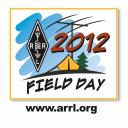 Every year, Amateur Radio operators (also know as hams - a term, personally, that I despise), take to the field
Every year, Amateur Radio operators (also know as hams - a term, personally, that I despise), take to the field
To work as many stations as possible on any and all amateur bands (excluding the 60, 30, 17, and 12-meter bands) and to learn to operate in abnormal situations in less than optimal conditions. Field Day is open to all amateurs in the areas covered by the ARRL/RAC Field Organizations and countries within IARU Region 2. DX stations residing in other regions may be contacted for credit, but are not eligible to submit entries. (ARRL)
Field Day 2012 is Saturday and Sunday, June 23-24 and plans are well underway. Clubs and individuals alike are busy pouring over the rules, trying to determine how many stations they can put on the air, how they will power them, how close they can put their antennas without causing interference and how they will dragoon, cajole and otherwise convince friends, family, and elected officials to visit, operate, and participate.
I have not participated in Field Day since 2008 for a number of reasons, least of which is lack of time. Field Day takes a lot of energy out of those that participate, even more out of those that organize, and organizing Field Day, if you do it as a show piece, takes a great deal of energy over and above the energy needed to operate. But I would encourage you to find your local club and check out the goings on. You will find a number of interesting technologies and techniques that you probably do not associate with Amateur Radio. In fact, I would suspect you will be amazed by what these hobbyists can do. And Amateur Radio operators are purely hobbyists - we receive no money for our public support activities, and we generally own all of the gear that we use. At any Field Day site, you will encounter hundreds, if not thousands of dollars in gear, antennas, and parts, whether commercial off the shelf or lovingly handmade. Each one treated with respect and care. And each operator willing to talk to you about what they are doing, and why they love the experience.
Amateur Radio is not, despite several lists to the contrary, an obsolete technology. In fact, Amateur Radio, and her experimenters are on the cutting edge of communications technology, responsible for wireless communications, satellites, and other forms of telecommunication that are the backbone of today's interconnected world. And without any form of government funding, Amateurs have come to the aid of their communities in the event of disaster, and lent their support, providing a life line out from the disaster sites until regular communications can be restored.
So while you are out and about over the weekend of the 23rd and you see antenna towers on an empty field, take a moment and drop in. You will be amazed what you will learn.
Because
...when all else fails...
